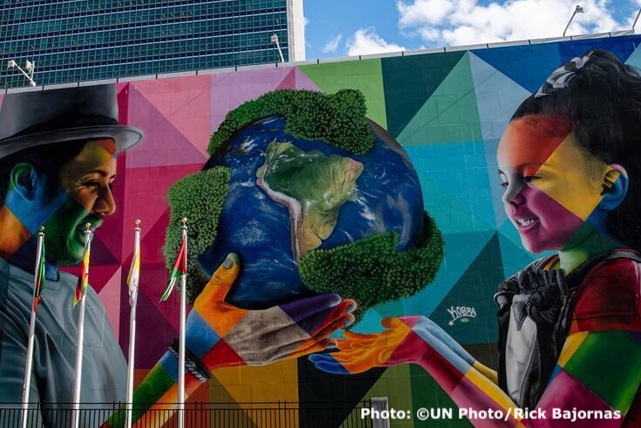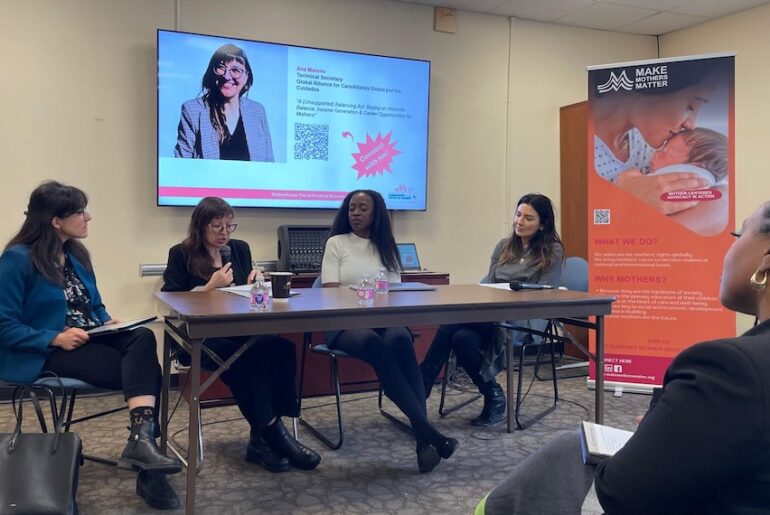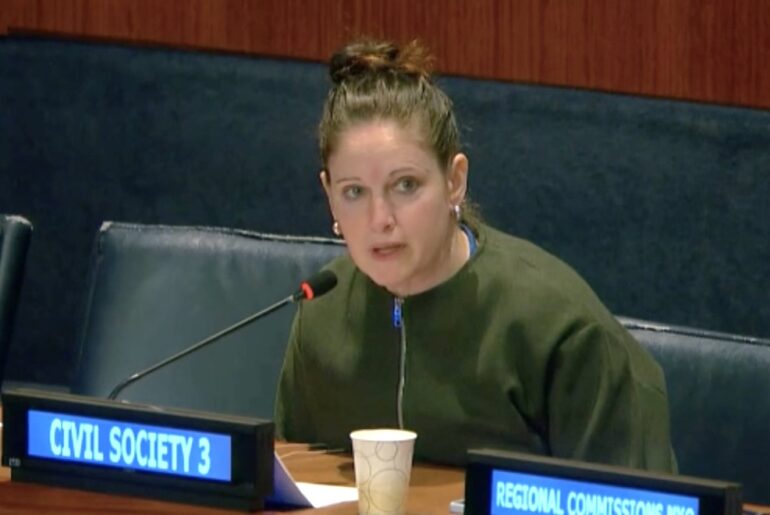A Pact for the future without Care?
22.02.24
UN New York – 22-23 September 2024, the UN Summit of the Future will bring together world leaders “to forge a new international consensus on how we deliver a better present and safeguard the future”. Ahead of this major conference, negotiations are ongoing for a Pact for the future that will focus on how Member States can deliver on existing commitments while also addressing the challenges of the future.
MMM has been actively engaged in the negotiation process, providing initial written input as well as commenting on the zero draft, and participating in online consultation meetings. Unfortunately, the current draft completely ignores care, whereas care is at the heart of what the world needs most: care for people and our planet.

Most of the multiple crises we face today have a common root cause: a lack of concern and respect for each other, for the environment and for other living beings. We urgently need a more caring world, and this is what governments must rally around: a commitment to (re)building a more caring society and economy.
At MMM we believe that recognition and support for care should therefore become central to decision making, and guide policymaking at every level. Care should be the main thread of the Pact for the Future.
The following is the input we provided for chapter one on ‘Sustainable development and financing for development’ and chapter two on ‘International peace and security’.
Sustainable development and financing for development
Whether paid or unpaid, Care work is foundational and indispensable, at the heart of humanity – and sustainable development. Care notably includes the unpaid and invisible work which is done on a daily basis, mostly by women and girls, to sustain families, communities, society and the economy.
Yet, the inequitable distribution of this unpaid or underpaid work is at the root of Gender inequalities and discriminations. It is the main structural barrier to women’s effective participation in the Labour market and in politics, and one of the major obstacles to their access to decision making positions.
Without addressing this vital issue, neither progress on gender equality nor indeed the 2030 development agenda and the SDGs, can be realised.
Care is also central to the realisation of Human Rights: it connects to most human rights, including the right to development. The work of caring – and the people behind it, in particular mothers – must therefore be recognised and supported. Care work and responsibilities must also be more equitably redistributed, first between men and women, but also across society (including through public infrastructures and services, and adequate supportive social protection).
Care should be considered in its broadest meaning: it is about people – in particular children, who are the next generation of workers and citizens, but also about our natural environment.
Care is central to the sustainability of life, which should be the main concern of governments.
Further, we urgently need to transform our current economic system, which prospers on the back of nature and women’s work, and which is at the root of many of the multiple global crises we face today including rising inequalities, environmental degradation, loss of biodiversity and climate change.
The Pact for the Future must lead to systemic change, including the transition to a new economic model that prioritises care, human rights and the wellbeing of people and the planet, instead of endless GDP growth and short-term profit for a few. In other words, it is time to refocus sustainable development on its social and environmental pillars, and prioritise social and environmental profitability instead of purely financial profits.
Whether you call it a human rights economy, a wellbeing economy or a caring economy, the new system must recognise, value and support caregivers and the work of caring for people and for the planet.
International peace and security
Recognising the value of caring for each other and for the planet, and supporting this indispensable work, is about building more caring communities and societies, a more caring world, which in turn fosters solidarity and cooperation, inclusion and trust, and ultimately peace.
Peace begins in the home, and the educational role of parents, especially that of the mother, is crucial.
It is indeed within the family that a child’s emotional balance is built, and that the values on which an individual is constructed are transmitted. It is also within the family that a child makes his first experiences of safety or distress, discovers the challenges of community life, and learns the peaceful or violent resolution for conflicts.
In addition, promoting men’s involvement as equitable, non-violent fathers, and engaging them in childcare not only contributes to gender equality within families, but also reduces domestic violence.
Peace also crucially begins during early childhood: how a child is nurtured and cared for early in life has a direct impact on brain structure and function. In particular, stimulation, responsive caregiving, attachment, bonding and creating safe contexts for children, all have a positive influence on their brain development and can help them grow, learn and thrive. Providing nurturing care during these early years is therefore critical to a child’s development to their full potential, and their ability to positively contribute to society and the economy later in life – triggering a virtuous circle and contributing to building peace.
Lastly, mothers share a common concern on the future of their children. As a result, they have a long-term perspective and they are good at building bridges, creating solidarity networks, and cultivating trust and confidence within local communities. All these skills are essential for conflict prevention and management, as well as post-conflict peace-building: mothers must therefore be recognised and empowered as essential peace builders.
Supporting early childhood care and education at family and community levels and the people doing this critical work – beginning with mothers – is a much-needed investment to create a culture of peace, respect for diversity and social cohesion; it is key to preventing conflicts and violence worldwide.
This is a collective responsibility. The key aspect of prevention – in particular giving parents and other caregivers better recognition as well as training, information and support – must be part of the Pact of the future’s chapter on international peace and security.
A UN Civil Society conference in support of the Summit of the Future will be held at the UN in Nairobi 9-10 May under the title “Shaping a Future of Global and Sustainable Progress”. MMM will be present, thanks to our Kenyan grassroots member Passion to Share. We sincerely hope that our call for a more caring future will be heard: care must be the way forward.
Time Poverty and the Motherhood Penalty
Unveiling Economic and Social Injustices
09.07.24
Mothers play an essential role in families by ensuring their loved ones are nourished, educated, and healthy, but their unpaid care work often leads to economic and social injustices, known
Envisioning care as a common thread to global crises
29.07.24
UN New York - Our virtual HLPF side-event brought together experts to shed light on how the various global crises we face (in particular climate change and other environmental crises,
We call for multi-stakeholder approach to recognise and support unpaid care work
21.07.24
UN New York - Participating in the meeting of the UN Economic and Social Council (ECOSOC) on care and support systems, MMM reaffirmed the principle of co-responsibility, which should underpin








